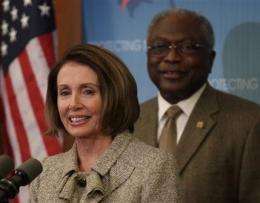AFL-CIO head flexible on taxing high-value plans

(AP) -- The head of the AFL-CIO said Monday he's willing to consider a tax on high-end health insurance plans to help pay for President Barack Obama's health care overhaul, as long as middle-class workers aren't hurt.
The comments by AFL-CIO President Richard Trumka indicated new flexibility on the issue from a powerful Democratic constituency as House and Senate leaders scramble to finalize sweeping health care legislation.
Trumka last month dismissed the proposed insurance plan tax as "outrageous."
The tax is the Senate's preferred method to pay for covering the uninsured, but labor leaders have worried their workers would be affected even though lawmakers were aiming the proposed tax at insurance plans offering the richest benefits - what Obama has called "Cadillac" plans.
"If you show me a definition of a Cadillac plan that hits the Cadillac plans and not the middle class, then we'd take a look at that, of course," Trumka told reporters on a conference call.
"If you wanted to tax the Goldman Sachs plans, I think that's fine," he said.
Trumka declined to say at what level he could support the tax.
As approved by the Senate Finance Committee, the tax to be levied on insurance companies would be equal to 40 percent of total premiums paid on insurance plans costing more than $8,000 annually for individuals and $21,000 for families. Retirees over age 55 and people in high-risk professions would be allowed to have somewhat more valuable plans before they're taxed.
The Finance version already reflected compromises in response to labor's concerns, and senators have said the values of plans to be taxed will be even higher in the final bill the Senate will debate. Majority Leader Harry Reid, D-Nev., on Monday was working to finalize the legislation in consultation with White House officials and key committee chairmen.
Trumka emphasized he continued to view the insurance tax plan as bad policy, saying that labor's preferred approach to pay for the $900 billion, 10-year legislation is the one taken by the House, which would raise income taxes on individuals earning more than $500,000 a year and households making more than $1 million.
Labor unions have also been strong advocates in favor of allowing the government to sell health insurance in competition with the private market. Trumka declined to support a version of that plan currently contemplated by Reid, which would establish a so-called "public option" insurance plan nationally but allow states to opt out.
"We support a robust public option. We think that's a step in the right direction but ... it's not there yet," Trumka said.
He also said that the federation supports requiring employers to provide insurance to their workers or pay a penalty. Instead of imposing such a requirement Reid is looking at charging large companies significant penalties if any worker needed government subsidies to buy coverage on their own.
For businesses with more than 50 employees, the fee could be as high as $750 multiplied by the total size of the work force if only a few workers needed federal aid. That is a more stringent penalty than in a bill that recently cleared the Senate Finance Committee.
Trumka refused to say what the AFL-CIO would do if its priorities aren't met in final health care legislation.
Labor was a key force in contributing to Obama's election and could make a difference if it puts its clout behind a congressional health bill. Trumka said his 11.5 million-member labor federation would be participating in a "day of action" Nov. 5 to lobby members of Congress in support of health overhaul legislation.
Trumka spoke as time grew short for Democratic leaders in the House and Senate to make key decisions to enable them to achieve Obama's goal of passing health legislation by year's end.
In the House, that means setting conditions under which the federal government would sell coverage in competition with private industry. The remaining disagreements among rank and file Democrats revolve largely around the fees to be paid doctors and hospitals under the plan, and whether they should be dictated by federal officials or established in negotiations.
Both Reid and House Speaker Nancy Pelosi are expected to make their decisions this week in hopes the long-delayed bills can come to a vote in early November.
In general, the bills taking shape in both houses are intended to expand coverage to millions who lack it, ban insurance industry practices such as denial of coverage for pre-existing medical conditions and slow the growth in medical spending nationally.
They would create a new federally regulated marketplace, termed an exchange, where individuals and families could purchase insurance sold by private industry. Federal subsidies would be available to help those at lower incomes afford the cost.
Subsidies would also be available to smaller businesses as an incentive for them to provide insurance.
©2009 The Associated Press. All rights reserved. This material may not be published, broadcast, rewritten or redistributed.


















